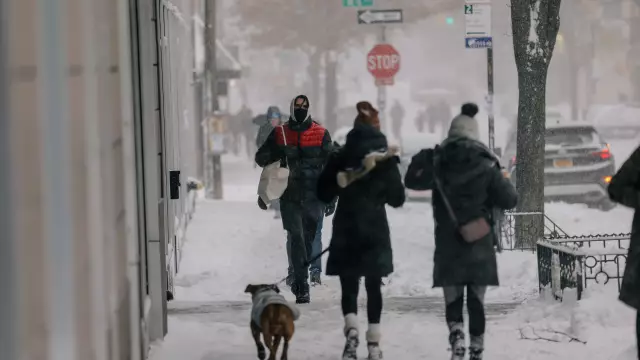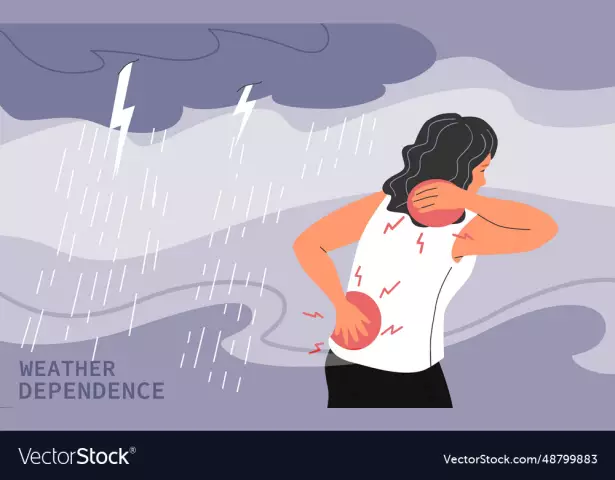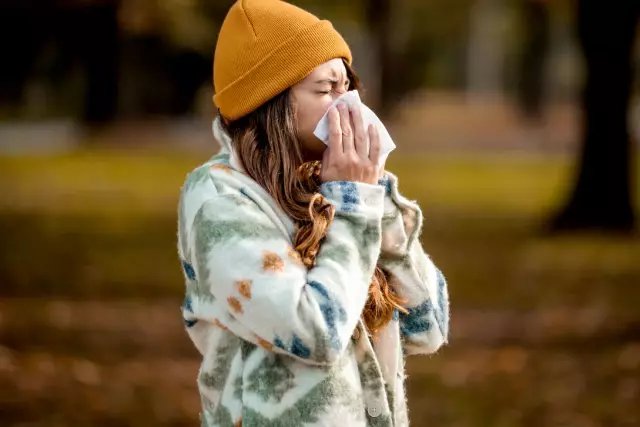- Author Rachel Wainwright wainwright@abchealthonline.com.
- Public 2023-12-15 07:39.
- Last modified 2025-11-02 20:14.
5 diseases that worsen in cold weather
Frosty air, fresh wind and light snow are associated with vigor, health and those active games that are possible only in winter. But, unfortunately, the cold season sometimes brings health problems. We are not talking about seasonal colds and frostbite, but about chronic ailments, the symptoms of which appear mainly in winter.
Cold dermatitis
This disease is also called cold allergy, although the ingestion of an extraneous protein agent in the body does not occur in this case. According to scientists, in people suffering from cold dermatitis, the role of an allergen is played by their own blood proteins, which "stick together" under the influence of low temperatures, forming a kind of conglomerates. It is their immune system that perceives them as foreign. The reaction to cold in such patients is manifested in the form of skin rashes. First, large (up to 5 cm in diameter) pink plaques are formed, which are then covered with crusts and cracks. In severe cases, lacrimation, runny nose, swelling and even heart failure may be added.
This pathology is not congenital: most often it occurs as a complication of infectious diseases, chronic inflammatory processes (even unsuccessfully healed caries), disorders of the digestive system. Sometimes cold dermatitis occurs after insect bites or medication (such as tetanus vaccine or oral contraceptives). The disease is most susceptible to women over 25 years old, children and adolescents.
The predisposition to cold dermatitis is easy to determine on your own using the so-called Duncan test: you need to press a piece of ice to the skin and hold it for about 5 minutes. The appearance of itching and burning will indicate that winter frosts can cause the unpleasant symptoms described above in a person. In the most sensitive patients, urticaria due to low temperatures occurs not only in winter, but also in the warm season, for example, after swimming in cool water.
Mild forms of cold dermatitis go away on their own - provided that the patient avoids hypothermia, wears clothes made from natural fibers, and follows the diet. The diet should be rich in vitamins, and foods that are considered sources of allergens (chocolate, citrus fruits, coffee, etc.) should be temporarily excluded. Such patients are advised to drink hot tea before going outside. If the disease persists, you will have to see a doctor and take antihistamines.

Source: depositphotos.com
Meteorological cheilitis
This is what doctors call cracks on the lips in the cold season. Oddly enough, men suffer from this ailment much more often than women. Perhaps because almost all of the fair sex use lipstick that protects lips from the effects of low temperatures.
The mechanism of cheilitis is not fully understood. In the diseased, the surface of the lips dries up, becomes inflamed, cracks and erosion zones appear on it. The likelihood of symptoms and their severity are directly related to the length of time spent outdoors.
Treatment of cheilitis is reduced to applying ointments containing corticosteroids (prednisolone, oxolinic) to the lips. Doctors recommend that such patients take increased doses of vitamins C, B, E and PP, use hygienic lipstick in cold weather.

Source: depositphotos.com
Raynaud's syndrome
The disease is more common in women. It is manifested by numbness of the fingers (sometimes the chin, earlobes and hands completely) due to a short-term reversible spasm of peripheral vessels. Under the influence of low temperatures or severe stress, the skin in the affected areas turns white and loses sensitivity. The attack lasts 15-20 minutes. Then there is a tingling sensation, the integument turns blue, reddens and returns to normal.
In 85% of cases, Raynaud's syndrome is not an independent ailment, but a consequence of pathologies of the connective or vascular tissue, negative changes in blood properties (including increased coagulability), circulatory disorders, and malfunctions of the endocrine glands. At risk are patients who regularly take vasoconstrictor drugs, as well as people who work in conditions of significant vibration or are often in contact with chemicals.
Raynaud's syndrome usually disappears with successful treatment of the underlying disorder. To relieve unpleasant symptoms, vasodilator and anti-inflammatory drugs are prescribed. The use of folk remedies (rubbing ointments, decoctions and tinctures of medicinal herbs) can be of great help in therapy.
The manifestations of Raynaud's syndrome may indicate the presence of severe pathologies, therefore, self-medication is unacceptable. At the first sign of illness, you should consult a doctor and undergo a full examination.

Source: depositphotos.com
Bronchospasm
When moving from a warm room to frost, many have difficulty breathing air. This is a completely normal phenomenon: the body tries to protect itself from hypothermia, and a short-term spasm of the bronchi occurs. In a healthy person, it passes quickly, especially if simple safety rules are observed (inhalation through the nose, protection of the mouth and nose with a scarf).
In the presence of chronic ailments (bronchial asthma, angina pectoris) or the consequences of a recent seasonal viral infection, the reaction to the cold is often much more unpleasant and even dangerous. Shortness of breath begins, a person experiences choking, pain and tightness in the chest, difficulty exhaling, cannot cough up phlegm, wheezing, a feeling of anxiety - this indicates the presence of a rapidly developing edema of the bronchial mucosa (bronchospasm). This condition is fraught with severe breathing disorders and oxygen starvation and requires urgent medical intervention.

Source: depositphotos.com
Winter form of psoriasis
Contrary to popular belief, most psoriasis patients experience maximum discomfort not in summer, but in winter. The factors provoking an exacerbation of the disease, in this case, are not so much low temperatures as the lack of moisture in the air (especially in rooms) and the need to constantly wear warm multilayered clothing. In addition, for patients with psoriasis, ultraviolet rays are curative, and not everyone is able to get insolation in the right amount at this time.
Patients suffering from seasonal exacerbations of psoriasis are advised to lead a healthy lifestyle, be outdoors as much as possible and maintain an optimal indoor climate.

Source: depositphotos.com
The wonderful winter season can give not only joy, but also health problems. In order not to become a victim of a serious illness, you need to carefully monitor your health in the cold season and, if unpleasant symptoms occur, contact a specialist.
YouTube video related to the article:

Maria Kulkes Medical journalist About the author
Education: First Moscow State Medical University named after I. M. Sechenov, specialty "General Medicine".
Found a mistake in the text? Select it and press Ctrl + Enter.






